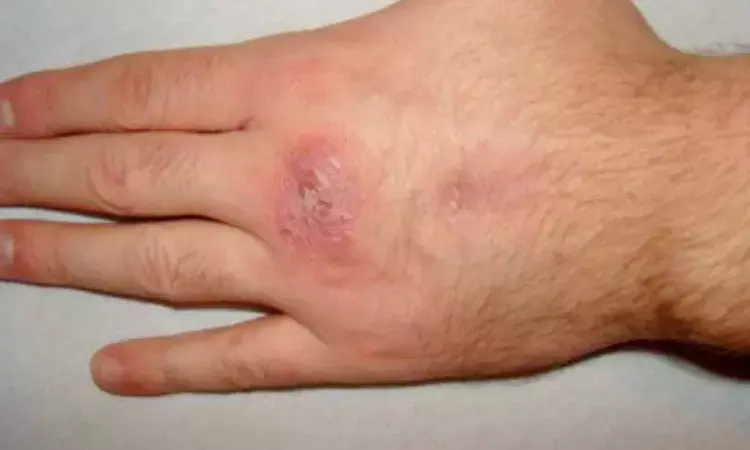- Home
- Medical news & Guidelines
- Anesthesiology
- Cardiology and CTVS
- Critical Care
- Dentistry
- Dermatology
- Diabetes and Endocrinology
- ENT
- Gastroenterology
- Medicine
- Nephrology
- Neurology
- Obstretics-Gynaecology
- Oncology
- Ophthalmology
- Orthopaedics
- Pediatrics-Neonatology
- Psychiatry
- Pulmonology
- Radiology
- Surgery
- Urology
- Laboratory Medicine
- Diet
- Nursing
- Paramedical
- Physiotherapy
- Health news
- Fact Check
- Bone Health Fact Check
- Brain Health Fact Check
- Cancer Related Fact Check
- Child Care Fact Check
- Dental and oral health fact check
- Diabetes and metabolic health fact check
- Diet and Nutrition Fact Check
- Eye and ENT Care Fact Check
- Fitness fact check
- Gut health fact check
- Heart health fact check
- Kidney health fact check
- Medical education fact check
- Men's health fact check
- Respiratory fact check
- Skin and hair care fact check
- Vaccine and Immunization fact check
- Women's health fact check
- AYUSH
- State News
- Andaman and Nicobar Islands
- Andhra Pradesh
- Arunachal Pradesh
- Assam
- Bihar
- Chandigarh
- Chattisgarh
- Dadra and Nagar Haveli
- Daman and Diu
- Delhi
- Goa
- Gujarat
- Haryana
- Himachal Pradesh
- Jammu & Kashmir
- Jharkhand
- Karnataka
- Kerala
- Ladakh
- Lakshadweep
- Madhya Pradesh
- Maharashtra
- Manipur
- Meghalaya
- Mizoram
- Nagaland
- Odisha
- Puducherry
- Punjab
- Rajasthan
- Sikkim
- Tamil Nadu
- Telangana
- Tripura
- Uttar Pradesh
- Uttrakhand
- West Bengal
- Medical Education
- Industry
Early postoperative exposure of skin to water safe, may not increase risk of infection or other complications: Study

Researchers in a study found that moisture on surgical wounds in the chosen 24-h postoperative period was not associated with an increase in the incidence of infection or other wound complications. It thereby rejects the conventional doctrine, which is the dry and undisturbed principle of the dressings in the time frame 24-72 hours post-surgery, unless there is a heightened possibility of moisture associated with most daily activities. Christen S. and colleagues reported it in the Journal of the American Academy of Dermatology.
Many standard patient instructions after surgical wound care include keeping the initial dressings clean and dry and free of contamination, and maintained for 24 to 72 hours to avoid the development of infection and to promote healing of the wound, which is in sharp contrast to the energetic levels required to meet daily activities like bathing, leisure, and optimum levels of functioning. The randomized controlled trial comparatively assessed standard keeping of wounds dry and covered for the period of 48 hours to early post-operative (6 hours) water exposure.
This was a randomized controlled, investigator-blinded, comparative study to assess infection rates and other outcomes. In total, 437 patients were randomized to early water exposure (6 hours post-operatively, n = 218) and standard care (48 hours post-operatively, n = 219). Primary outcome: Culture-proven infection. Other outcomes that were measured: bleeding rate, bruising rate, and scar assessment according to the Patient and Observer Scar Assessment Scale.
The key findings of the study were:
• The incidence of culture-proven infection was comparable between the early water exposure group, (1.8%), and the standard care group, (1.4%); this difference was not significant with (p > 0.99).
• There were no differences between groups in rates of bleeding or bruising.
• The scar results, recorded with the POSAS, did not reveal any significant differences between both groups, thus showing similar cosmetic results.
The study has revealed that allowing surgical wounds to get wet as early as six hours after surgery does not increase the rate of complications or infections. Hence, this increases flexibility in the post-operative care routine for patients, hence helping them to return back to normal activities earlier than thought.
This study was conducted in a single academic center. Generalizability of the results is therefore limited, and further studies are required in different clinical settings for the confirmation of these findings.
Surgical wounds can be safely exposed to water immediately after the operation without increasing the risk of infections or compromising the final cosmetic outcome. Evidence suggesting that post-operative care recommendations should be revised to allow greater patient convenience and comfort.
Reference:
Samaan, C., Kim, Y., Zhou, S., Kirby, J. S., & Cartee, T. V. (2024). Early post-operative water exposure does not increase complications in cutaneous surgeries: A randomized, investigator-blinded, controlled trial. Journal of the American Academy of Dermatology. https://doi.org/10.1016/j.jaad.2024.05.098
Dr Riya Dave has completed dentistry from Gujarat University in 2022. She is a dentist and accomplished medical and scientific writer known for her commitment to bridging the gap between clinical expertise and accessible healthcare information. She has been actively involved in writing blogs related to health and wellness.
Dr Kamal Kant Kohli-MBBS, DTCD- a chest specialist with more than 30 years of practice and a flair for writing clinical articles, Dr Kamal Kant Kohli joined Medical Dialogues as a Chief Editor of Medical News. Besides writing articles, as an editor, he proofreads and verifies all the medical content published on Medical Dialogues including those coming from journals, studies,medical conferences,guidelines etc. Email: drkohli@medicaldialogues.in. Contact no. 011-43720751


